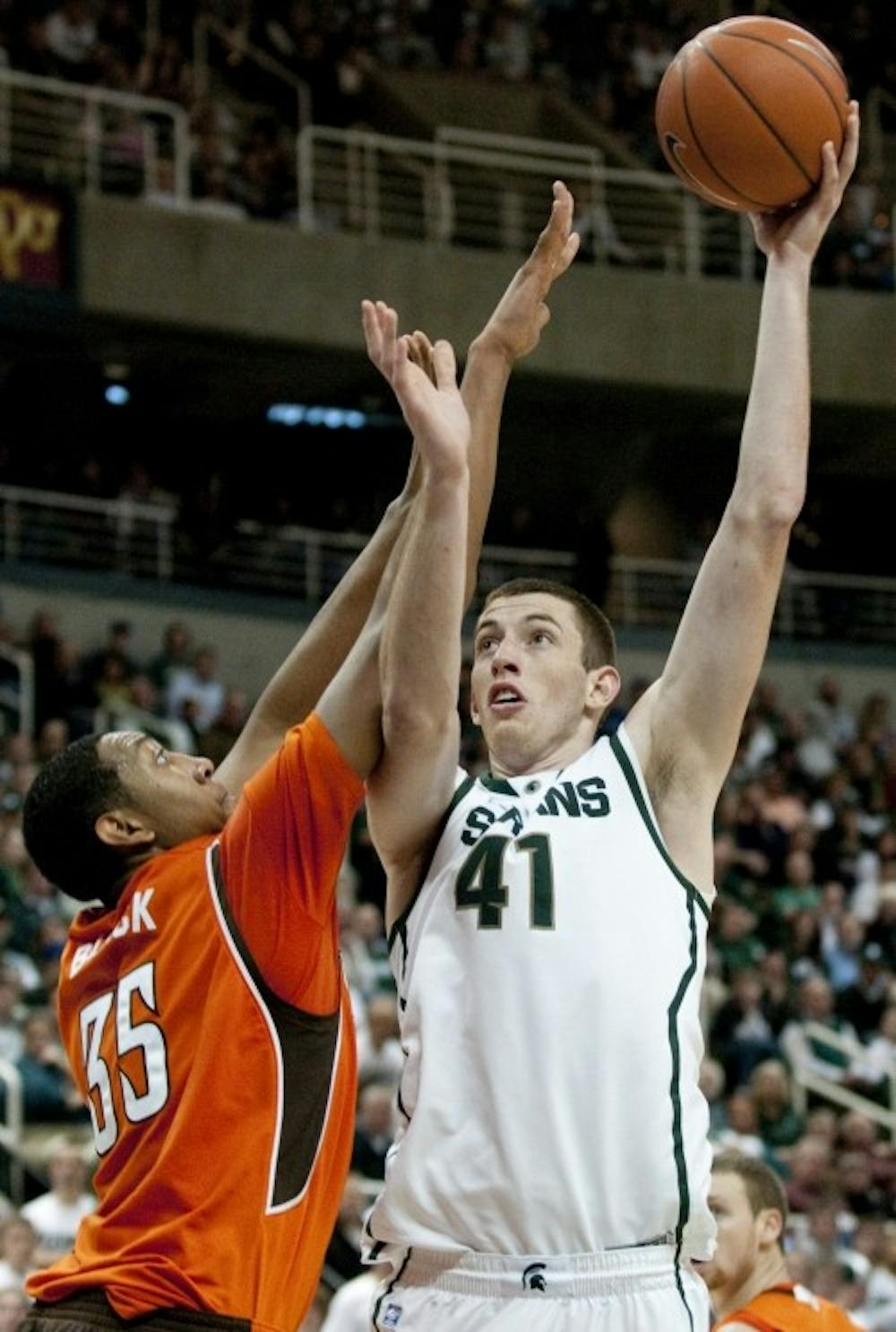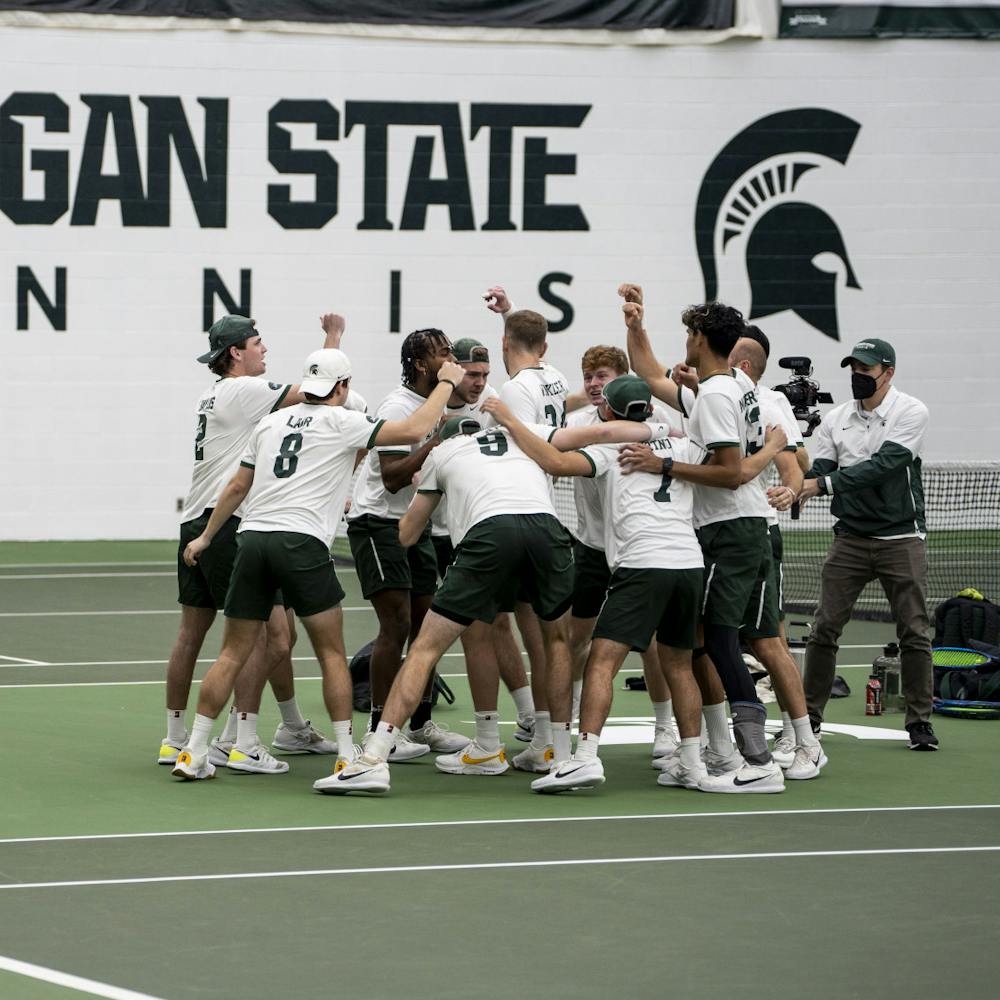While the drunken Twitter rant provided by former Michigan State basketball player Garrick Sherman on May 27 was entertaining for all who saw, it could be indicative of a larger issue of the collegiate sports landscape.
For those who don’t know, Sherman is an ex-MSU basketball player who transferred to the University of Notre Dame after his sophomore season in East Lansing.
After the final day of his pro-season with the Georgian team BC Dinamo Tbilisi, Sherman had a few drinks the night of May 27 and later cited boredom as a driving factor in his tweeting.
While it may have seemed to some that Sherman was throwing Michigan State and his former coach Tom Izzo under the bus by talking about how he helped Durrell Summers pass a drug test by peeing into a condom and giving it to him, he made very clear during his string of tweets that his aim was directed at the NCAA and its inability to do anything right.
And he might have shed light on an important issue. Are the drug tests conducted by the NCAA and colleges across the country as effective as they can be?
“If nothing else gets accomplished. Let this Twitter rant show the inability of the ncaa to do anything at all of substance,” Sherman said on Twitter.
The NCAA has a very strict policy for drug testing in an attempt to prevent cheating, according to an email from Christopher Radford, the associate director of public and media relations for the NCAA.
“The NCAA follows a strict collection protocol, (including) fully observed sample collections to thwart urine substitution and contamination,” Radford said via email. “Samples are tested for concentration, and diuretics and other urine manipulators.”
Dr. Jeff Kovan, MSU director of sports medicine and performance, said one of the biggest challenges for schools around the country and the NCAA is constantly trying to come up with new ways to stop athletes from cheating the drug testing process.
“There are kinds of protocols you have to do for testing now, that either you have to be naked when you go into the room, and then you don’t have to be watched, or you can take your pants down and someone watches you go to the bathroom,” Kovan said in an email.
Testing for street drugs
Kovan said that while drug testing for common street drugs such as marijuana or alcohol is important, they have been urging the NCAA to stop and just let the schools handle street drug testing. He said the NCAA has cut back on street drug testing and focused primarily on the performance enhancers.
“We know that many of the street drugs have a negative effect on performance,” Kovan said via email. “So for both academic and athletic reasons, we feel there is justification in testing for these to maximize both areas.”
Kovan added they do not want to be police when it comes to drug use, but to educate their athletes to prepare them for the business world that is waiting for those who do not make it to the professional level.
“Employers don’t generally ask why or are willing to counsel an employee if they fail a drug test,” Kovan said via email. “We hope that by our education, testing and treatment program, we can help better prepare the athletes for their careers once they graduate from MSU.”
However, Sherman called the drug testing process for college out, saying that if the NCAA wanted it to be efficient, they would use a hair test rather than the traditional urine test.
“NCAA could do hair test any day of the week and actually be a real organization, but who would wanna take the top 25 players from the tourney,” Sherman said on Twitter.
Urine test alternatives
Hair testing is an alternative form of drug testing that is not as widely used. Research shows, however, that hair testing can show drug use from several months instead of the couple of weeks a urine test is typically able to detect.
Through a hair test, drugs will typically show up seven to 10 days after the drug was used, as that is the time it takes the affected hairs to grow above the scalp, and can detect drug use up to 90 days after use, according to the Laboratory Corporation of America.
The method of urine collection the NCAA uses, as well as many individual colleges, has a period of the drug typically showing up between two and five hours after smoking, but does not show up for as long of a period — anywhere up to 12 weeks, depending on how often someone smokes.
Radford said the NCAA chooses to use urine testing rather than hair testing, however, because urine testing better detects steroids and other PEDs. Urine testing also allows the World Anti-Doping Agency (WADA) to conduct all the required analyses required to meet the strict International Olympic Committee (IOC) code.
Kovan said Michigan State experimented using hair testing about 10 years ago, but ultimately went back to the urine test because the hair test was found to be less accurate.
“But the hair testing we talked about years ago, and we actually did it for a little while and found the problem with hair testing is that it gives you results from three months’ time, that part is OK, so you get a little broader spectrum of what an athlete might have used,” Kovan said.
“But there is also some question as to (whether) secondhand smoke or other things have an impact on that? If the athlete doesn’t have any hair that’s long enough, because you need about 1 inch of hair to be able to get a sampling, then you have troubles with that. So there’s a lot of inadequacies of the hair testing which is why most schools have gone away from it.”
Kovan said blood testing is the method most likely to take the place of urine testing in the future. He said the main issues with blood testing currently are that it is expensive and there is no easy way to do it.
Kovan said there have been talks with the NCAA about the potential of blood testing, but they have to find a way to do it without requiring a major needle poke, but rather, just a small sample of blood.







